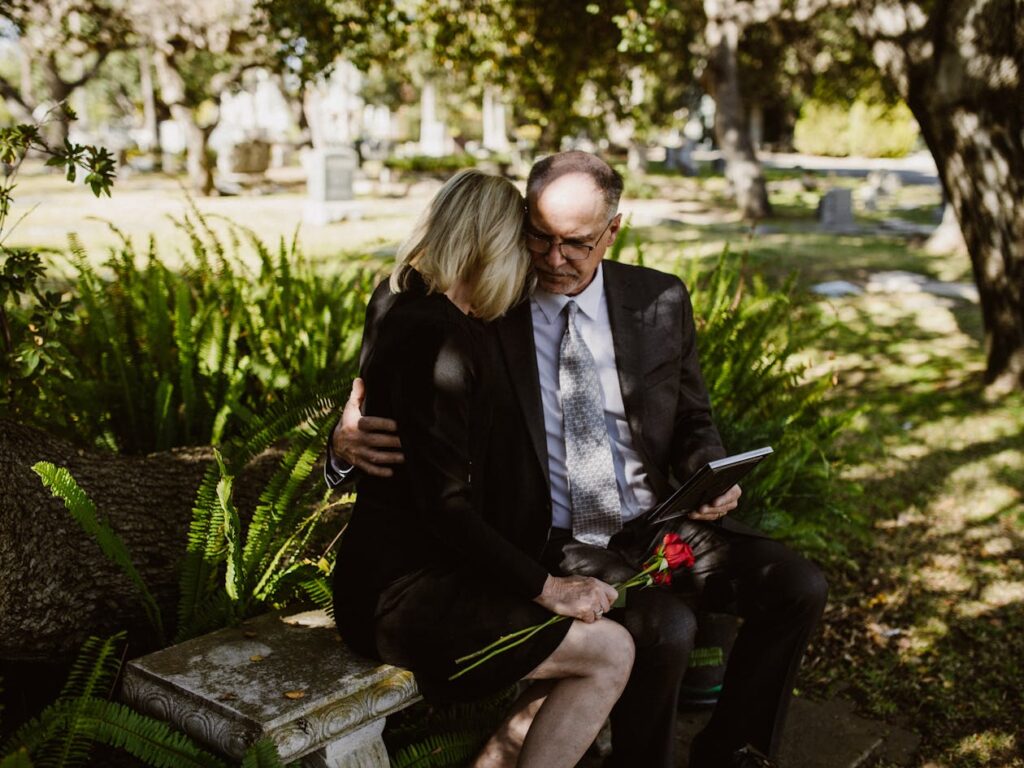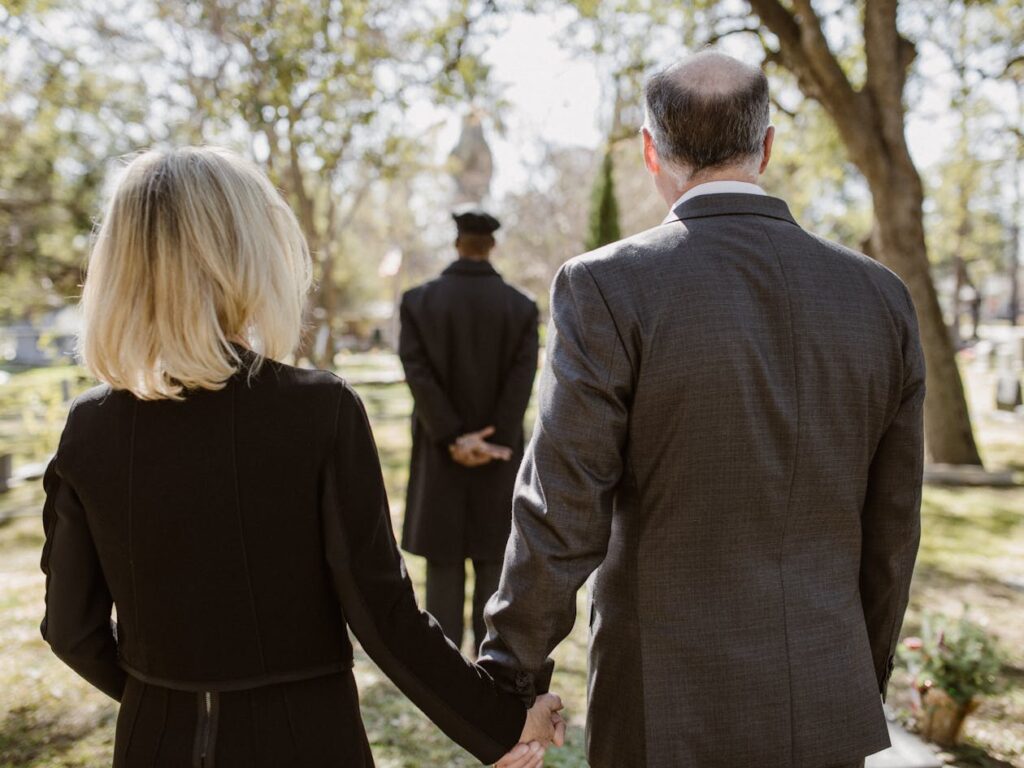7 Meaningful Phrases That Express Condolences Better Than “Sorry for Your Loss”

Four simple words. Everyone says them. Nobody wants to hear them.
“Sorry for your loss” has become the default response when death visits a family. We mumble these words at funerals, text them after hearing bad news, and whisper them during awkward encounters with grieving friends. But something feels wrong every time we say them.
Your stomach clenches. Your mouth goes dry. Even as you speak, you know these words fall flat against the wall of someone’s grief. You watch their face crumple slightly, see them force a weak smile, and hear their automatic “thank you” response.
What if those four words actually make things worse? What if your attempt to comfort accidentally adds to their pain? What if everything you thought you knew about offering condolences was completely backwards?
Most people never realize the hidden damage lurking inside “sorry for your loss.” Each word carries unintended meanings that pierce grieving hearts. But once you understand why this phrase fails so badly, you’ll discover seven alternatives that actually bring comfort when people need it most.
Words That Wound: Dissecting “Sorry for Your Loss”
Breaking down this overused phrase reveals why it creates such awkward, painful moments between people who genuinely care about each other.
“Sorry” immediately places guilt on grieving hearts. When someone says sorry, we usually hear an apology for wrongdoing. In grief situations, this word suggests the bereaved person has somehow burdened you with their tragedy. Even drowning in their own pain, grieving people don’t want others suffering because of them.
“For” creates a direct line connecting their dead loved one to your discomfort. Instead of bridging the gap between hearts, this tiny word builds a wall that separates their loss from your life.
“Your” isolates them completely in their suffering. While you might feel compassion, this word declares that their tragedy belongs to them alone. You’re just an observer watching from safe distance.
“Loss” might be the cruelest word of all. It suggests they failed to hold on tight enough. Like they misplaced something valuable instead of watching someone they loved die. Loss implies they could have prevented what happened if they’d just tried harder.
Four words. One breath. A universe of unintended hurt delivered by people who genuinely want to help.
7 Phrases That Actually Heal Hearts
Real comfort requires words that acknowledge pain without adding to it. These seven alternatives create genuine connection during life’s darkest moments.
Phrase 1: “I’m here for whatever you need, no timeline”

Grief doesn’t follow schedules. Some days feel manageable. Others crush your spirit without warning. Society expects people to “move on” after a few weeks, but healing takes much longer.
Offering support without time limits removes crushing pressure to perform normalcy. Your grieving friend won’t worry about wearing out your patience or asking for too much help. They can lean on you during bad days without guilt about taking too long to feel better.
Actions matter more than words here. Show up with groceries without being asked. Send random texts months later checking in. Remember difficult dates like birthdays and death anniversaries when everyone else has moved on.
Phrase 2: “[Name] brought so much joy to people who knew them”
Most people avoid saying the dead person’s name, thinking it will cause more pain. They use pronouns like “he” or “she” instead, accidentally erasing the person’s identity.
Grieving people desperately want to hear their loved one’s name spoken aloud. Names carry memories, personality, and proof that this person existed as more than just a pronoun. Hearing their name validates the relationship and honors their life.
Share specific memories when possible. “Sarah always made me laugh during lunch breaks” or “Tom’s terrible dad jokes somehow always cheered everyone up.” These details prove their loved one made a lasting impact on others too.
Phrase 3: “Your sadness makes complete sense, and this really sucks”

Grief includes messy emotions that society doesn’t like discussing. Anger at doctors who couldn’t save them. Relief when suffering finally ended. Guilt about arguments you had before they died. Confusion about how to keep living without them.
Acknowledging that death genuinely sucks validates their experience without trying to fix or minimize their pain. Sometimes people need someone else to say out loud what they’re thinking: this situation is absolutely terrible and unfair.
Honesty beats politeness when supporting grieving friends. Skip the sugar-coating and acknowledge the brutal reality they’re facing. Your authentic response will feel more comforting than polished platitudes.
Phrase 4: “You have my heart, and I’m thinking of you often”
Death creates sudden isolation even when surrounded by caring people. Grief makes everything feel different and strange. Normal activities seem impossible. Simple conversations become exhausting.
Promising ongoing emotional support builds a bridge from isolation back to community. Unlike “sorry for your loss,” this phrase looks forward instead of backward. It focuses on your relationship with them rather than their relationship with loss.
Follow through matters here. Actually think about them regularly. Send brief messages on random days. Remember them during holidays when grief hits hardest. Small gestures prove your words mean something.
Phrase 5: “No perfect words exist, but I remember when [specific memory]”

Admitting your inadequacy while offering something real shows genuine care. You’re not pretending to have magical phrases that erase pain. Instead, you’re sharing treasured moments that honor their loved one’s memory.
Specific details make memories powerful. Instead of “he was a good person,” try “I remember when he spent his whole Saturday helping me move, then insisted on buying pizza for everyone.” Concrete examples prove their loved one’s character and impact.
Memory sharing keeps the deceased person alive in daily conversation. Grieving people often fear others will forget their loved one or grow tired of hearing stories. Your willingness to remember and share creates precious gifts.
Phrase 6: “I wish you strength to feel everything you need to feel”
Society pressures grieving people to stay strong for others. Family members worry about appearing weak in public. Friends hide tears to avoid making others uncomfortable. Children learn to suppress emotions to protect worried parents.
Encouraging honest emotional expression supports healing through feeling rather than avoiding. Grief work requires courage to face painful emotions instead of numbing them. Your permission to feel freely removes social pressure to perform strength.
Different emotions serve different purposes in healing. Anger gives energy to handle practical matters. Sadness honors the relationship’s importance. Fear acknowledges life’s uncertainty. All emotions deserve respect and space.
Phrase 7: “Let me help by listening whenever you want to talk about them”

Action combined with emotional availability provides comprehensive support. Grieving people need both practical assistance and safe spaces for memory sharing. Offering specific ways to help removes decision-making burden during overwhelming times.
Listening skills matter more than advice-giving abilities. Most grieving people don’t want solutions or explanations. They want someone who cares enough to sit with their pain without trying to fix it. Your presence speaks louder than your words.
Create regular opportunities for conversation. Weekly coffee dates. Long walks together. Phone calls during difficult times. Consistent availability proves your support isn’t just temporary sympathy.
Dangerous Words: What Never to Say

Certain phrases cause damage despite good intentions. “Everything happens for a reason” dismisses their pain and suggests their loved one died for some greater purpose. “At least they’re not suffering anymore” minimizes current agony by focusing on imagined relief.
“I know exactly how you feel” steals their unique experience and makes their loss about your past pain. “Time heals all wounds” rushes their process and implies they should feel better faster than they do.
Skip religious explanations unless you know their beliefs well. Avoid comparing their loss to others or ranking types of grief. Never suggest they should feel grateful for time they had together.
Presence Beats Perfection Every Time
Perfect condolence phrases don’t exist. Grief is too complex and personal for one-size-fits-all responses. What matters most is showing up authentically and staying committed to supporting someone through their darkest time.
Authentic care beats flawless responses every time. Grieving people need witnesses to their pain, not advice givers trying to speed up healing. Real comfort comes through human connection, not clever words.
Choose phrases that feel genuine to your personality and relationship. Practice active listening skills. Remember that your continued presence matters more than anything you could possibly say.
Grief changes people forever, but loving support helps them rebuild meaningful lives around their loss. Your willingness to walk alongside them during this journey creates healing that lasts far beyond funeral flowers and sympathy cards.
Loading...

